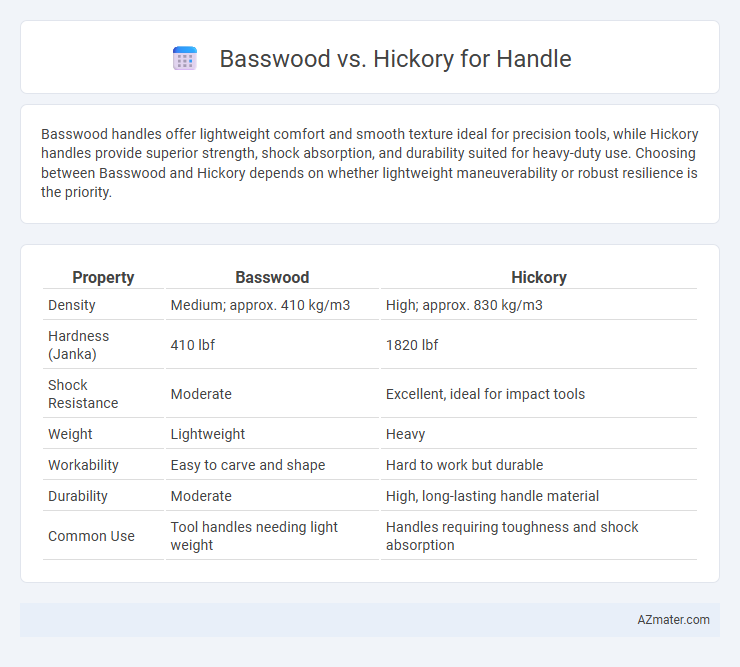Basswood handles offer lightweight comfort and smooth texture ideal for precision tools, while Hickory handles provide superior strength, shock absorption, and durability suited for heavy-duty use. Choosing between Basswood and Hickory depends on whether lightweight maneuverability or robust resilience is the priority.
Table of Comparison
| Property | Basswood | Hickory |
|---|---|---|
| Density | Medium; approx. 410 kg/m3 | High; approx. 830 kg/m3 |
| Hardness (Janka) | 410 lbf | 1820 lbf |
| Shock Resistance | Moderate | Excellent, ideal for impact tools |
| Weight | Lightweight | Heavy |
| Workability | Easy to carve and shape | Hard to work but durable |
| Durability | Moderate | High, long-lasting handle material |
| Common Use | Tool handles needing light weight | Handles requiring toughness and shock absorption |
Introduction to Basswood and Hickory Handles
Basswood handles are renowned for their lightweight and smooth texture, making them ideal for tools that require precision and comfortable grip, while hickory handles provide exceptional strength and shock absorption, favored in heavy-duty applications like hammers and axes. The cellular structure of basswood offers a soft yet resilient surface that minimizes hand fatigue, whereas hickory's dense grain pattern enhances durability and impact resistance under repeated stress. Choosing between basswood and hickory handles depends on the specific demands of the task, balancing comfort with toughness for optimal tool performance.
Key Properties of Basswood
Basswood handles are valued for their lightweight and exceptional shock absorption, making them ideal for reducing user fatigue during extended use. This soft hardwood features a fine, even grain that provides smoothness and ease of shaping, enhancing comfort and control. Compared to hickory, basswood offers moderate durability and lower density, emphasizing comfort over extreme strength in tool handle applications.
Key Properties of Hickory
Hickory is renowned for its exceptional strength, hardness, and shock resistance, making it a preferred choice for tool handles that require durability and impact absorption. Its dense grain structure provides superior resistance to wear and breakage compared to basswood, which tends to be softer and less durable. The resilience and toughness of hickory contribute to longer-lasting performance in demanding applications such as axe and hammer handles.
Strength and Durability Comparison
Hickory handles exhibit superior strength and durability due to their dense grain structure, making them highly resistant to shocks and heavy impacts. Basswood, while lighter and softer, lacks the hardness of hickory, resulting in less resistance to wear and breakage under strenuous use. For tools requiring long-lasting handles that withstand rigorous demands, hickory is the preferred choice over basswood.
Weight and Balance Considerations
Basswood handles are significantly lighter than hickory, contributing to reduced overall tool weight and less user fatigue during extended use. Hickory provides superior balance due to its denser, tougher composition, offering enhanced control and durability in heavy-duty tasks. Choosing between basswood and hickory hinges on the desired balance between lightweight comfort and robust strength for specific tool applications.
Comfort and Grip Differences
Basswood handles offer a lightweight and smooth texture that enhances comfort during prolonged use, making them ideal for tasks requiring finesse and reduced hand fatigue. Hickory handles provide superior grip strength and shock absorption due to their dense, fibrous structure, which excels in heavy-duty applications requiring durability and firm control. The choice between basswood and hickory hinges on balancing comfort with grip performance, where basswood promotes ergonomic ease and hickory ensures resilient handling.
Workability and Shaping
Basswood offers exceptional workability due to its fine, even grain, making it ideal for detailed shaping and carving in handles. Hickory is denser and tougher, providing greater durability but requiring more effort to shape and work with hand tools. The choice between basswood and hickory hinges on the balance between ease of shaping and the desired handle strength.
Cost and Availability
Basswood handles typically cost less than hickory due to the wood's softer nature and faster growth rates, making it more readily available. Hickory, being denser and tougher, commands higher prices and can be less accessible depending on regional supply. Both woods are commonly found in North America, but basswood's widespread abundance often results in lower overall handle expenses.
Best Uses for Each Wood Type
Basswood handles are ideal for applications requiring lightweight tools with excellent shock absorption, such as woodworking chisels and carving knives, due to their soft yet durable grain. Hickory handles excel in high-impact scenarios like axes, hammers, and baseball bats because of their exceptional strength, toughness, and resistance to wear. Choosing basswood enhances precision and comfort in delicate tasks, while hickory provides superior durability and force withstand in heavy-duty use.
Conclusion: Which Handle Material to Choose
Hickory offers superior strength, durability, and shock resistance, making it the preferred choice for tool handles subjected to heavy use and impact. Basswood, being lighter and softer, provides excellent comfort and is ideal for intricate carving or lighter applications where precision outweighs toughness. Choosing between basswood and hickory depends on the tool's purpose: hickory excels in demanding environments while basswood supports detailed work requiring ease of handling.

Infographic: Basswood vs Hickory for Handle
 azmater.com
azmater.com